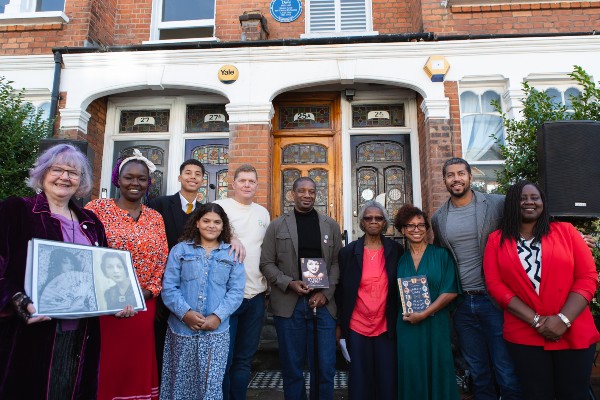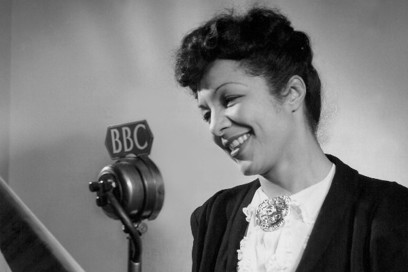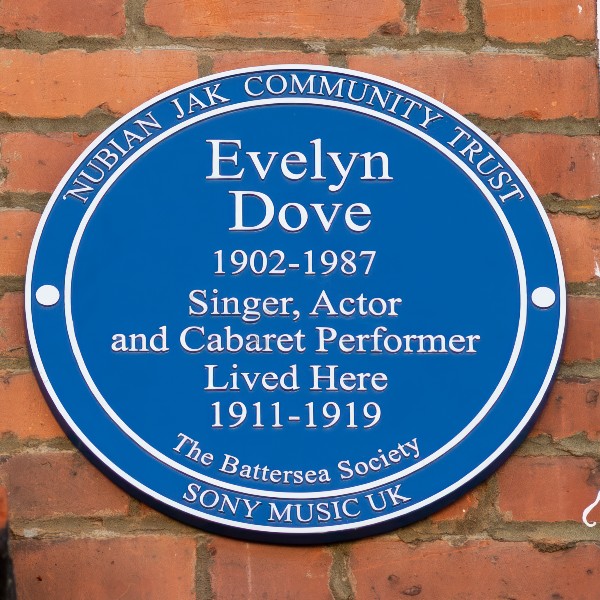Landmark blue plaque for Battersea woman launches Black History Month
Published: Friday, October 6, 2023
Wandsworth has marked Black History Month with the unveiling of a blue plaque to mark the former Battersea home of ground-breaking singer and performer Evelyn Dove.
Share this

Born in 1902, Evelyn studied music and singing at the Royal Academy of Music before embarking on a successful international jazz and cabaret career and becoming the first woman of African heritage to be broadcast on BBC Radio, three years after its launch in 1925.
Born in 1902 to Francis Dove, a London-based barrister from Sierra Leone and his British wife Augusta, the 1911 Census records Evelyn and her mother as living at 25a Barnard Road, Battersea.

'Precious heritage'
Kemi Akinola, Wandsworth Council’s Deputy Leader was joined by MP for Battersea, Marsha de Cordova, and family descendants of Evelyn Dove at the event which was hosted by The Battersea Society and the Nubian Jak Community Trust in partnership with the Sony Music UK Social Justice Fund.
Councillor Kemi Akinola said: “We're proud that Wandsworth has been home to remarkable people from so many different backgrounds. This precious heritage is such an important part of our local culture which we are highlighting in our bid for London Borough of Culture 2025.
“Evelyn Dove made an incredible contribution to the cultural life of this country with many 'firsts' as a Black woman, so I'm delighted we are finally recognising her achievements as we launch our Black History Month.”
Dr Jak Beula, CEO of the Nubian Jak Community Trust, said: “The Nubian Jak team is delighted to honour Evelyn Dove with a London blue plaque. The plaque will be the first ever to a woman of colour in Battersea.”
Marsha de Cordova, MP for Battersea said: “There was no better way to kick off Black History Month than to unveil the first blue plaque in Battersea dedicated to a Black woman. It was fantastic to recognise the contributions Evelyn Dove made to our country and its culture including as the first woman of African heritage to sing on BBC Radio. I am pleased that her trailblazing achievements have been honoured."
This year's national Black History Month theme is 'Celebrating our Sisters', highlighting pioneering Black women.
Wandsworth Council's programme of events showcases Black culture and celebrates the Black women who are making a real difference for Wandsworth.
The plaque was installed on 29 September 2023 by the Nubian Jak Community Trust in partnership with the Sony Music UK Social Justice Fund and with support from The Battersea Society and Wandsworth Council.
More about Evelyn Dove
Following a private education Evelyn studied piano, elocution, and contralto at the Royal Academy of Music. After graduating in 1919, she had hoped for a career in opera or the concert hall circuit but found the worlds of jazz and cabaret more appealing. By the 1921 Census, Evelyn was performing with the Southern Syncopated Orchestra, a band comprising Caribbean, West African and African American musicians, widely credited for pioneering jazz in the UK and Europe. She then toured Europe, Asia, and America.
Evelyn achieved a number of firsts throughout the course of her life, but perhaps her most notable achievement was becoming the first woman of African heritage to be broadcast on BBC Radio, three years after its launch in 1925. She starred in various productions for the station during the ‘30s and ‘40s, and had her own music series, ‘Sweet and Lovely’. In 1945 she hosted ‘Serenade in Sepia’ with Trinidadian folk singer Edric Conner which ran for forty-five weeks, proving so popular that it also aired on television.
After the war Evelyn left the BBC to work in cabaret in India, France, and Spain. On her eventual return to the UK, work proved difficult to come by and she took odd jobs and worked as an understudy in a few productions, before securing stage and TV roles once more.
As she got older her work and health began to fade and she lost contact with her family. In 1972 Evelyn was admitted to a nursing home in Epsom, Surrey, where she died of pneumonia in 1987.

